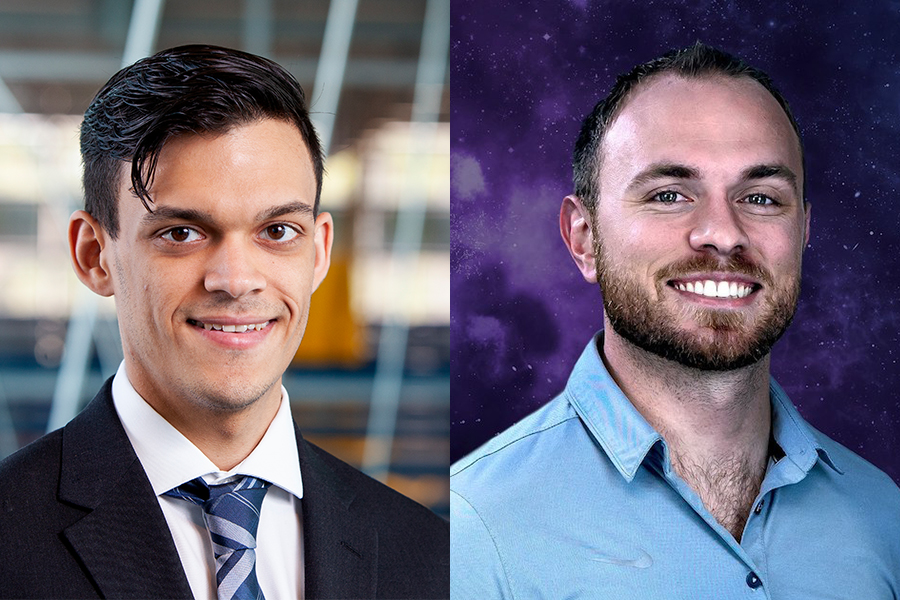FSU alumni develop AI program to train emergency phone operators, save lives

Florida State University scientific computing alumni have developed a speech-to-speech artificial intelligence program used to help train phone operators who dispatch emergency services.
Through a partnership with Priority Dispatch, the call-simulator software produced by NewSci — an artificial intelligence software development company based in Tallahassee — has been adopted by 911 call centers across the nation and around the globe.
“The call simulator is an AI-powered training program we’ve developed over the past few years that simulates a caller in an emergency situation,” said two-time FSU alumnus and NewSci engineer Eric Sharkey. “Emergency call center operators need the necessary training to respond appropriately to a large variety of situations, and our simulator allows them to practice various emergency calls without risk to the public.”
The speech-to-speech AI tool is a system that accepts speech input from the user and responds with AI-generated synthesized speech output. The system uses a speech-to-text model to transcribe user input into text, then natural language understanding algorithms are applied to distinguish meaning in the text. These algorithms create an appropriate text response for the user. A text-to-speech model then generates synthesized speech for the text response and returns it to the user, simulating the real-life conversation a dispatcher might encounter during a call.
In addition to lowering the cost of training, dispatch trainees can focus on practicing challenging protocols such as helping children callers and training for low-frequency, high-acuity situations like plane crashes. They can also repeat simulations as many times as needed and access training from anywhere with an internet connection rather than depending on the availability of trainers at a call center. While caller types in traditional training are limited by a trainer’s ability to mimic individuals who might need assistance or access people to make a simulation call, caller personas in AI training can employ a variety of ages, genders, linguistic backgrounds, and stress levels to better prepare dispatchers for real-world situations.
“At NewSci, we are proud to know that our software will improve the quality of training for emergency call center operators and effectively save lives. It is incredibly fulfilling for me to work on a project that can positively impact so many people,” Sharkey said.
The augmented-training software reduces the need for human role-playing and the overall cost of training dispatchers. It also decreases operator training time and helps operators start saving lives sooner.
Since its founding in 2014, NewSci has hired several alumni from FSU’s Department of Computer Science and FSU’s Department of Scientific Computing.
“The core curriculum in the Department of Scientific Computing trains students in the disciplines of mathematics, computing, and statistics, preparing them to model real-world phenomena, analyze a model’s mathematical and statistical properties, and interactively explore their model via simulation on high-performance computers,” said scientific computing alumnus Nathan Crock. “This is the process we used to develop the call simulator.”
Crock directs NewSci Labs — NewSci’s research facility that works closely with the company to apply AI to real-world challenges — and recruited Sharkey, who earned a bachelor’s degree in computer engineering with a minor in mathematics and a master’s degree in scientific computing, as the company’s first undergraduate intern in 2018. Sharkey now leads the development of the call simulator software as a machine learning engineer. His days consist of machine learning research and full-stack development — the creation of both the client-side, the part of software end-users encounter, and server sides of a web application.
“FSU’s scientific computing program has given me a great foundation for all the skills I use daily in my work at NewSci,” Sharkey said. “The master’s program gave me valuable experience in creating highly performant software and provided me with a strong mathematical background that allows me to stay on the cutting edge of machine learning technology.”
Scientific computing chair Gordon Erlebacher said the programs delivered within the department prepare students to take concepts and algorithms from one discipline and apply them to other disciplines, which is what happened during the developmental phase of the call simulator.
“We train our students to be flexible and adapt to the fast-paced changes in technology all around us. NewSci’s new product is a testament to a strong education program in the Department of Scientific Computing,” Erlebacher said.
